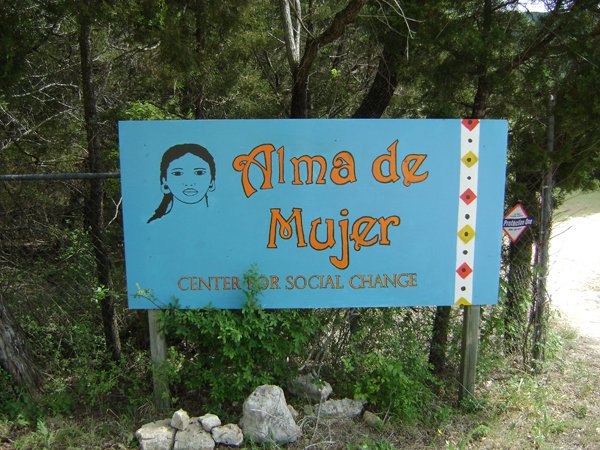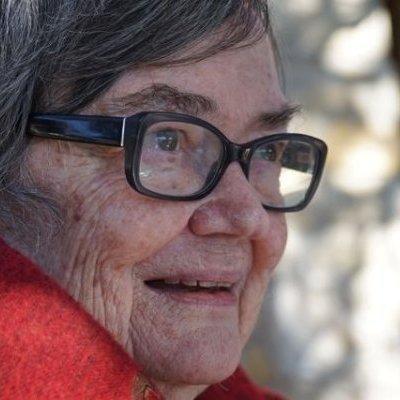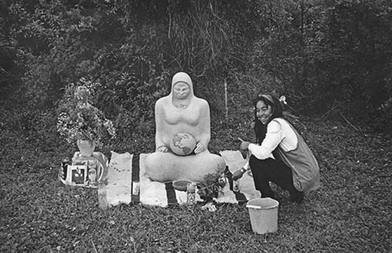Alma de Mujer: A Gift of Intersectional Restoration and Empowerment
BY DASH HARRIS, LGBTQ+ HERITAGE INTERN
Alma de Mujer Entrance, courtesy of Alma de Mujer
In the far reaches of Austin, off the winding roads leading to Volente, sits a sacred meeting space. Sacred in both intention and practice, Alma de Mujer exists as a sanctuary for lesbians, Indigenous women, and marginalized communities. The genesis of Alma de Mujer is deeply intertwined with the transformative journey of Texan philosopher Genevieve Vaughan, a visionary committed to catalyzing social change rooted in women's values. Born into privilege in Corpus Christi, Vaughan's journey took a transformative turn in 1980 when she committed her wealth to catalyzing social change rooted in women's values. She chose the name "Alma de Mujer," meaning "Soul of the Woman," not only to reflect the essence of this retreat center but also to honor the memory of Alma Sabatini, Vaughan’s dear friend and Italian feminist. In commemorating Sabatini's spirit within the land dedicated to social transformation under women's leadership, Vaughan laid the foundation for a sanctuary that transcends physical boundaries and embodies a profound ethos of empowerment and inclusivity.
Genevieve Vaughan and the Gift Economy
Genevieve Vaughan, courtesy of Texas Legacy Project
Genevieve Vaughan's journey to Alma de Mujer traverses continents and ideologies, shaped by her experiences in Italy from 1963 to 1983. Living amidst a tapestry of global perspectives in Rome, Vaughan gained invaluable insights into the intricacies of power dynamics, geopolitical influences, and the interconnectedness of social movements across borders. The international feminist consciousness-raising groups she engaged with underscored a shared rejection of external influences, particularly the dominant role of the United States in shaping global affairs. This awareness of patriarchal domination, whether in international politics or within societal structures, fueled Vaughan's resolve to effect change at the source – returning to her homeland, the United States, to amplify her voice in the pursuit of justice and equity.
Central to Vaughan's vision for societal transformation is her theory of Gift Economy, rooted in the distinction between giving to fulfill needs and exchange-based transactions driven by ego and equivalence. Rejecting the prevailing ethos of patriarchal capitalism, which prioritizes profit and hierarchical structures, Vaughan advocates for a return to a mother-based economic paradigm grounded in nurturing, reciprocity, and communal well-being. This ethos aligns closely with indigenous economies historically rooted in gift-giving principles and communal stewardship of resources, an ethos tragically eroded by colonialism and capitalist exploitation.
The trajectory of Vaughan's activism and philanthropy mirrors her commitment to manifesting transformative change through direct action and strategic investments in social justice initiatives. By channeling her resources towards activist groups, funding women's leadership, supporting media projects amplifying marginalized voices, and advocating for peace and disarmament, Vaughan engages in a holistic approach to creating a more equitable and compassionate society. The embodiment of Vaughan's vision is palpable in projects like the retreat center at Alma de Mujer, where Vaughan relied on the wisdom and authority of indigenous leaders, such as sculptor Marsha Gomez.
Marsha Gomez (1951-1998): Steward, Activist, Artist
Marsha Anne Gomez with sculpture Madre del Mondo, courtesy of Alma’s website
Since opening in 1988, Alma de Mujer has served as a retreat center resonating with the needs of queer women and women of color, offering solace, community, and opportunity. Under the stewardship of sculptor and educator Marsha Anne Gomez, Alma de Mujer thrived as a hub of creativity and activism.
Marsha Gomez arrived in Austin in 1981, bringing her skills as an art teacher, activist, and organizer. Gomez was a founding member of the Indigenous Women’s Network; in 1988, she joined with Genevieve Vaughan to create the Foundation for A Compassionate Society. In 1996, the retreat center was gifted to the Indigenous Women’s Network, with Gomez at the helm. She ran Alma de Mujer until her death in 1998.
Gomez's most renowned creation is her sculpture titled Madre del Mundo (Mother of the World), depicting an indigenous woman of life size cradling a globe in her embrace. The Foundation for a Compassionate Society and Grandmothers for Peace commissioned this artwork in 1998 for a Mother's Day demonstration on Western Shoshone land near a nuclear testing site in Nye County, Nevada. Madre del Mundo symbolized the nurturing and maternal energies in opposition to the violence caused by bombing activities. On a photograph of the sculpture, Gomez inscribed the message "save the land, honor treaty rights, stop nuclear testing on our sacred earth." During the demonstration, the sculpture was confiscated by the Bureau of Land Management and later returned following a legal dispute. The sculpture now resides on the Alma de Mujer property, a reminder of Marsha Gomez's profound impact on Alma de Mujer and the broader landscape of social change. Alongside colleague and friend Esther Martinez, Marsha nurtured the retreat center, transforming it into a haven of natural and spiritual beauty. Their efforts created a welcoming space that not only provided solace but also became a catalyst for positive outcomes in various progressive group meetings.
An Intersectional Past, An Expansive Future
The legacy of Alma de Mujer extends far beyond physical spaces and material investments. It symbolizes a convergence of visionary leadership, feminist solidarity, and a steadfast commitment to reclaiming narratives of empowerment, inclusion, and communal stewardship. Vaughan's journey, intertwined with the resilience and activism of individuals like Marsha Gómez and the Indigenous Women's Network, serves as a beacon of hope and inspiration for a community striving towards healing, justice, and collective liberation.
Now entrusted to the Indigenous Women’s Network, the center continues to champion communal stewardship and resource-sharing among indigenous communities. Marsha's role as a leader and advocate not only ensured the center's legacy as a resource hub but also underscores the importance of collective action in shaping a more equitable and sustainable future.
In honoring Vaughan's advocacy for indigenous peoples and the restoration of lands, Alma de Mujer echoes a timeless call for reconciliation, restitution, and a reclamation of communal heritage, and exemplifies the transformative potential of gift-giving principles, nurturing a legacy of empowerment, restoration, and solidarity that resonates across generations and cultures.
Courtesy of Alma de Mujer
As Alma de Mujer continues to evolve and inspire, it remains a testament to the power of collective action, visionary leadership, and the enduring legacy of women's contributions to social change. In the spirit of Alma Sabatini, Horatio Bardwell Cushman, and countless others who championed justice and equity, Alma de Mujer stands as a living witness to the transformative potential of gifts given with compassion, integrity, and a steadfast commitment to creating a more just and harmonious world for all.
Alma de Mujer's legacy transcends its physical confines, characterized by a rich array of events that honor diversity and foster unity. These include gatherings like the Queer People of Color Summit, and the HIV Negative Gay & Bisexual Men Weekend Retreat in 1996.
Alma de Mujer currently operates as a gift-based retreat and education space, headed by a council of 13 Indigenous Women volunteers who “connect to the sacred land & wish to see it shared and loved by others.”
Funding for Preservation Austin’s LGBTQ+ Heritage Internship is provided by the City of Austin Planning Department, Historic Preservation Office.





